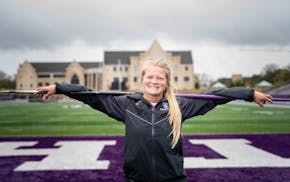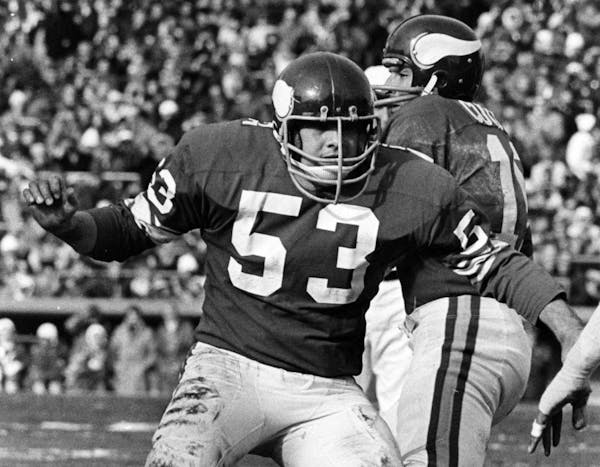Kurt Coleman had never personally met Tyson Gentry before he walked into his hospital room on an April day in 2006.
Coleman was 17 and scared. He didn't know how Gentry and his family would react to seeing him. Or how he'd react to seeing Gentry, who was paralyzed from the chest down, an injury he suffered after being cleanly tackled by Coleman in practice at Ohio State.
Coleman brought a high school friend with him for support.
"We could tell by the look on his face that he was very distraught," said Bob Gentry, Tyson's father.
Then something remarkable happened when Coleman introduced himself. The Gentry family embraced him, showered him with compassion. Told him that everything will be OK and that they didn't blame him for the devastating injury Tyson suffered.
"It was a weight lifted off my shoulders," Coleman said.
That was eight years ago. Today, Coleman is competing for a spot in the Vikings secondary at safety. Tyson Gentry lives in Florida, still unable to walk yet still hopeful that he'll get out of his wheelchair someday.
The two remain friends, forever linked by one routine hit on a football field.
"We have a bond between us," Tyson said.
Coleman arrived at Ohio State that spring after graduating high school early. He played cornerback and everything was still new to him. He barely knew his teammates.
Coleman lined up across from Gentry, a sophomore wide receiver, in a team drill that day. Gentry ran a simple curl route and Coleman tackled him from behind, a clean hit.
"It was just a random play," Tyson said. "I've been hit a lot harder than that."
But he landed awkwardly and suffered a broken C4 vertebra in his neck. His parents were watching practice and knew something serious had happened when their son didn't get up.
Gentry had two major surgeries, but even in that difficult time, he remained optimistic about his future. He even made a point to comfort Coleman from his hospital bed.
"I told him, 'I don't blame you at all,' " Tyson said.
Coleman blamed himself, even though he knew that he did nothing wrong. He briefly considered quitting football. He once gave an opponent a concussion on a tackle, but this was so much different. A kid was paralyzed because of his hit.
"I play this game tough, I play it with emotion and with heart," he said. "I never play to physically hurt somebody."
Coleman says he recovered emotionally because of his faith and the support he received from his family and Gentry's family. That meant the world to a 17-year-old trying to come to terms with his role in a life-changing event.
"The love that Tyson and his family shared for me really helped me get through that," he said. "I'm so blessed to have them. I had to come to the realization that it could have happened to anybody at any given time. Once I understood that, I was able to forgive myself."
Bob Gentry doesn't use the word "forgiveness" because that implies Coleman did something wrong. That wasn't the case, so how could the family be mad at him?
"We wanted him to feel OK about things, as well as his family," Bob said. "We're not here from a vendetta standpoint in terms of, 'You caused this.' It was never that. Never even a question of that."
Their bond strengthened over the years. The Gentrys often invited Coleman to their home for dinner. Coleman visited Tyson during his rehab. Once, Tyson spoke to the entire Ohio State team and thanked Coleman for being a part of his life.
"Ty just inspires people," former Buckeyes coach Jim Tressel said. "He's been fantastic. That made everyone's world a little bit more livable when his attitude was so wonderful."
Gentry's resolve has never wavered. He graduated from Ohio State and earned his master's degree in rehabilitation counseling. He's certified in that field in Florida.
He married his college girlfriend last October and got his driver's license renewed so that he can drive a specialized van.
Gentry also established a nonprofit organization that will provide financial assistance to people with disabilities and their families. That includes war veterans who have suffered serious injuries in battle.
Gentry, who just turned 29, remains hopeful about his prognosis as well. He refuses to dwell on his limitations.
"I'm content with the life that I have," he said. "I don't regret anything. If I have to be in a wheelchair the rest of my life, then I'm at peace with that. But at the same time, I'm still constantly trying to move my legs and hopeful that I'll get out of the chair one day."
Coleman shares that same dream. The two friends exchange occasional text messages throughout the year, just to catch up or offer encouragement. They sent each other wedding gifts. Coleman recently invited Gentry to attend the Vikings game at Tampa Bay in October.
They have a bond "for life," Coleman said. It's a friendship he couldn't possibly have imagined when he walked into that hospital, nervous about how he'd be accepted.
"The relationship that we have is unbreakable," he said.
Chip Scoggins chip.scoggins@startribune.com

'I'm a living miracle.' Tommies athlete goes from broken bones to broken record

Scoggins: Why these Wolves really can 'accomplish anything'

Scoggins: Wolves' decisionmaker knew what to do, what not to do

Scoggins: Yes, Coach, Vikings defense really improved


